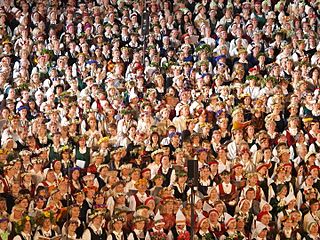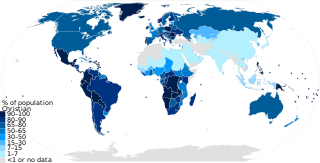Related Research Articles

The Republic of Ireland had a population of 4,761,865 at the 2016 census.

Latvians are a Baltic ethnic group and nation native to Latvia and the immediate geographical region, the Baltics. They are occasionally also referred to as Letts, especially in older bibliography. Latvians share a common Latvian language, culture and history.
The Central Statistics Office is the statistical agency responsible for the gathering of "information relating to economic, social and general activities and conditions" in Ireland, in particular the National Census which is held every five years. The office is answerable to the Taoiseach and has its main offices in Cork.
A nationwide census, known as Census 2001, was conducted in the United Kingdom on Sunday, 29 April 2001. This was the 20th UK census and recorded a resident population of 58,789,194.

As of the year 2020, Christianity had approximately 2.38 billion+ adherents out of a worldwide population of about 7.8 billion people. It represents nearly one-third of the world's population and is the largest religion in the world, with the three largest groups of Christians being the Catholic Church, Protestantism, and the Eastern Orthodox Church. The largest Christian denomination is the Catholic Church, with 1.3 billion baptized members. The second largest Christian branch is either Protestantism, or the Eastern Orthodox Church.

The Cool Biz campaign is a Japanese campaign initiated by the Japanese Ministry of the Environment from summer 2005 as a means to help reduce Japanese electricity consumption by limiting the use of air conditioning. This was enabled by changing the standard office air conditioner temperature to 28 °C and introducing a liberal summer dress code in the bureaucracy of the Japanese government so staff could work in the warmer temperature. The campaign then spread to the private sector.

The Central Statistical Agency is an agency of the government of Ethiopia designated to provide all surveys and censuses for that country used to monitor economic and social growth, as well as to act as an official training center in that field. It is part of the Ethiopian Ministry of Finance and Economic Development. The Director General of the CSA is Samia Zekaria. Before 9 March 1989 the CSA was known as the Central Statistical Office (CSO).

As of December 2017, installed capacity of wind power in the European Union totaled 169.3 gigawatts (GW). In 2017, a total of 15,680 MW of wind power was installed, representing 55% of all new power capacity, and the wind power generated 336 TWh of electricity, enough to supply 11.6% of the EU's electricity consumption.

The internet is an important contributor to Ireland's economy and education. The telecommunications infrastructure in the Republic of Ireland provides Internet access to businesses and home users in various forms, including fibre, cable, DSL, wireless, Fixed Wireless and mobile. In 2019, 91% of households have access to the Internet in Ireland at home, with 88% of individuals reporting that they had used the internet in the three months prior to interview.
The Ministry of Statistics and Programme Implementation (MoSPI) is a ministry of Government of India concerned with coverage and quality aspects of statistics released. The surveys conducted by the Ministry are based on scientific sampling methods.

The economy of the Republic of Ireland is a highly developed knowledge economy, focused on services in high-tech, life sciences, financial services and agribusiness, including agrifood. Ireland is an open economy and ranks first for high-value foreign direct investment (FDI) flows. In the global GDP per capita tables, Ireland ranks 4th of 186 in the IMF table and 4th of 187 in the World Bank ranking.

A census of the population of the United Kingdom is taken every ten years. The 2011 census was held in all countries of the UK on 27 March 2011. It was the first UK census which could be completed online via the Internet. The Office for National Statistics (ONS) is responsible for the census in England and Wales, the General Register Office for Scotland (GROS) is responsible for the census in Scotland, and the Northern Ireland Statistics and Research Agency (NISRA) is responsible for the census in Northern Ireland.
The Survey on Household Income and Wealth (SHIW) is a statistical survey conducted by the Sample Surveys Division of the Banca d'Italia . The main objective of the SHIW is to study the economic behaviours of Italian households. In recent years the survey has been integrated in international research projects such as the Luxembourg Income Study and the Luxembourg Wealth Study, whose aim is to produce a comparable cross-national Data Archive on household income and wealth. Starting from 2008, the survey has also been part of a project conducted by the European Central Bank to produce a harmonized survey on household finances and consumption in the Euro area.

The 2011 census of Ireland was held on Sunday, 10 April 2011. It was administered by the Central Statistics Office of the Republic of Ireland and found the population of the Republic to be 4,588,252 people. Before the census, the latest population estimate was published in September 2010 and calculated that the Irish population had been 4,470,700 in April 2010. The previous census took place five years earlier, on Sunday, 23 April 2006. The subsequent census took place five years later, on 24 April 2016.
The Indian Readership Survey (IRS) is the largest continuous readership research study in the world with an annual sample size exceeding 2.56 lakh (256,000) respondents. IRS collects a comprehensive range of demographic information and provides extensive coverage of consumer and product categories, including cars, household appliances, household durables, household care and personal care products, food and beverages, finance and holidays. IRS is not restricted to survey of readership alone but is synonymous with both readership & consumption across various FMCG products throughout India. IRS covers information on over 100 product categories. IRS is conducted by MRUC and RSCI.
Northern Ireland has differing legislation and policy in relation to disability than in other areas of the UK, due to the various governmental powers and competencies that are devolved to the Northern Ireland Assembly.

Hinduism is a minority religion in Ireland, followed by 0.4% of the country's population. It is also the second fastest-growing religions by percentage in Ireland. Despite this, there are only a small number of recognised temples in the country.

Modified gross national income, Modified GNI or GNI* was created by the Central Bank of Ireland in February 2017 as a new way to measure the Irish economy, and Irish indebtedness, due to the increasing distortion that the base erosion and profit shifting ("BEPS") tools of US multinational tax schemes were having on Irish GNP and Irish GDP; the climax being the July 2016 leprechaun economics affair with Apple Inc.
Census 2022 is the forthcoming national census in the Republic of Ireland. It is due to be held on Sunday, 3 April 2022, and is organised by the Central Statistics Office (CSO).
References
- ↑ "Press Release Household Finance and Consumption Survey 2013" Archived 2017-01-06 at the Wayback Machine Retrieved on 2015-02-14.
- ↑ "The Household Finance and Consumption Survey (HFCS)" Retrieved on 2015-02-14.
- ↑ "Press Release Household Finance and Consumption Survey 2013" Archived 2017-01-06 at the Wayback Machine Retrieved on 2015-02-14.
- ↑ "HFCS FAQs for respondents" Retrieved on 2015-02-14.
- ↑ "Irish mortgage debt ratio highest in euro area, says CSO" Retrieved on 2015-02-14.
- ↑ "Press Release Household Finance and Consumption Survey 2013" Archived 2017-01-06 at the Wayback Machine Retrieved on 2015-02-14.
- ↑ "Central Statistics Office Release First Household Finance and Consumption Survey" Retrieved on 2015-02-14.
- ↑ "Press Release Household Finance and Consumption Survey 2013" Archived 2017-01-06 at the Wayback Machine Retrieved on 2015-02-14.
- ↑ "About HFCS" Retrieved on 2015-02-14.
- ↑ "HFCS FAQ for respondents" Retrieved on 2015-02-14.
- ↑ "About HFCS" Retrieved on 2015-02-14.